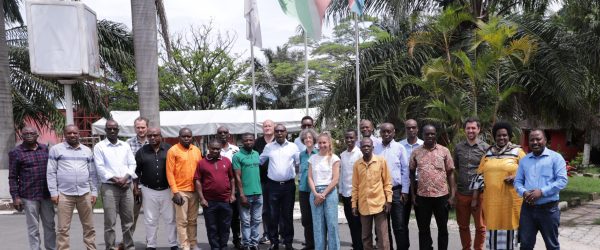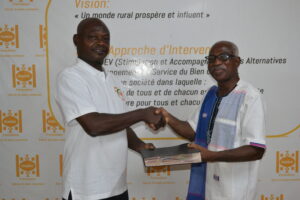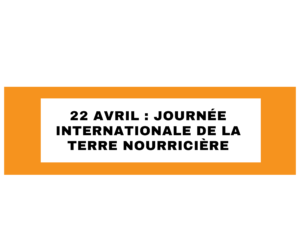Clearly defining an evaluation mechanism at the start of a program is one of the strategies for its success. This was the aim of the workshop to launch support for TAPSA II partners in the Great Lakes region, organized in Bujumbura from May 2 to 5, 2022 by CCFD-Terre Solidaire in partnership with Agrarian Systems Consulting, based in Montpellier, France.
 First of all, the day of May 2, 2023 was devoted to preparations for the workshop itself, on the premises of Inades-Formation Burundi, with all the partners. The Inades-Formation Burundi team assigned directly to the TAPSA II program, the team of experts from Agrarian Systems Consulting and the TAPSA II program manager from CCFD-Terre Solidaire took a moment to refresh memories on the development process. of the theory of change and impact path as the preferred monitoring and evaluation tool through TAPSA II. During this pre-session, the two teams visited the workshop agenda and shared facilitation tasks.
First of all, the day of May 2, 2023 was devoted to preparations for the workshop itself, on the premises of Inades-Formation Burundi, with all the partners. The Inades-Formation Burundi team assigned directly to the TAPSA II program, the team of experts from Agrarian Systems Consulting and the TAPSA II program manager from CCFD-Terre Solidaire took a moment to refresh memories on the development process. of the theory of change and impact path as the preferred monitoring and evaluation tool through TAPSA II. During this pre-session, the two teams visited the workshop agenda and shared facilitation tasks.
At the start of the workshop itself, Madame DUFOUR Gwenaëlle, Deputy Director General of CCFD-Terre Solidaire,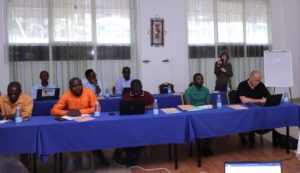 , solemnly welcomed the participants in the presence of representatives of the 5 partner organizations of CCFD-Terre Solidaire in the implementation of the TAPSA II program (2022-2026). They are ACORD-Burundi, CAPAD, ACORD-Rwanda, UWAKI Nord Kivu, IFDP du Sud Kivu in DRC and Inades-Formation Burundi, which is responsible for regional coordination. Satisfied with the achievements of these partners under the permanent supervision of the project manager, she wished everyone a good brainstorming workshop.
, solemnly welcomed the participants in the presence of representatives of the 5 partner organizations of CCFD-Terre Solidaire in the implementation of the TAPSA II program (2022-2026). They are ACORD-Burundi, CAPAD, ACORD-Rwanda, UWAKI Nord Kivu, IFDP du Sud Kivu in DRC and Inades-Formation Burundi, which is responsible for regional coordination. Satisfied with the achievements of these partners under the permanent supervision of the project manager, she wished everyone a good brainstorming workshop.
The experts demonstrated the main stages and advantages of a monitoring and evaluation system known as the theory of change and impact path in the implementation of TAPSA II.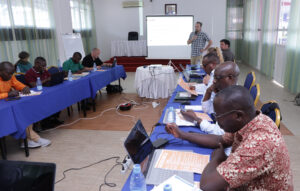 Given that this exercise had already been carried out by Inades-Formation Burundi in 2022 with the support of the same experts, its product served as a model, during the workshop, in guiding the other organizations called upon to do the same according to their respective themes.
Given that this exercise had already been carried out by Inades-Formation Burundi in 2022 with the support of the same experts, its product served as a model, during the workshop, in guiding the other organizations called upon to do the same according to their respective themes.
The participants found this tool very interesting, as it differs from the traditional approach to monitoring and evaluation. 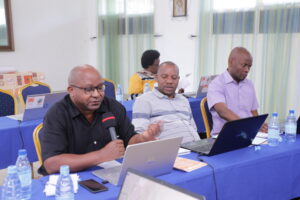 It’s more or less complete, based on a clearly defined vision of a desired future in relation to the current situation, and how to do things differently. To achieve this, the experts specify that the sphere of control must be limited to activities, products and resources. This sphere makes it possible to define monitoring indicators for the implementation of interventions in a well-defined area.
It’s more or less complete, based on a clearly defined vision of a desired future in relation to the current situation, and how to do things differently. To achieve this, the experts specify that the sphere of control must be limited to activities, products and resources. This sphere makes it possible to define monitoring indicators for the implementation of interventions in a well-defined area.
Working in groups and with the support of facilitators made up of experts from Agrarian Systems Consulting, the head of TAPSA II at CCFD and the Inades-Formation Burundi team, each organization built its own impact path. 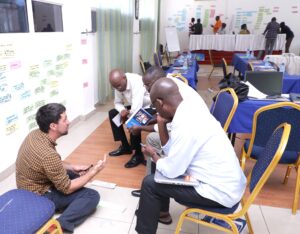 This exercise enabled all these partners to take greater ownership of their programs. Brainstorming was used as a participatory methodology. They finally understood the importance of this tool in the implementation of the program, which has just started, to achieve the predefined objectives and create an impact in the communities of a territory. As a result, it was recommended that these organizations consult this built path every time, involve identified stakeholders and work on targets to control potential risks and assumptions.
This exercise enabled all these partners to take greater ownership of their programs. Brainstorming was used as a participatory methodology. They finally understood the importance of this tool in the implementation of the program, which has just started, to achieve the predefined objectives and create an impact in the communities of a territory. As a result, it was recommended that these organizations consult this built path every time, involve identified stakeholders and work on targets to control potential risks and assumptions.
Last but not least, participants appreciate the theory of change and impact path device they have learned for the 1st time, and are willing to put it into practice. 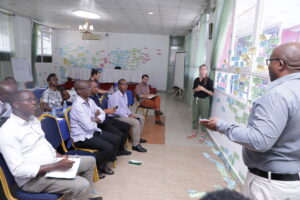 They understand the need for advance planning, the mobilization of different resources and the distribution of tasks to ensure that it is taken into account on a day-to-day basis. They ended with the establishment of a support schedule for the duration of the program.
They understand the need for advance planning, the mobilization of different resources and the distribution of tasks to ensure that it is taken into account on a day-to-day basis. They ended with the establishment of a support schedule for the duration of the program.
Published by Richard HAVYARIMANA
Advocacy and Communication Officer

